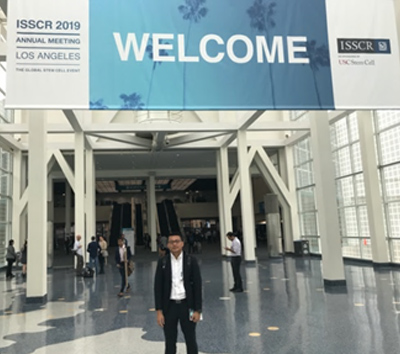Student Voice

Kyaw Thu Aung
Nationality
Myanmar
University/Institution Name
Okayama University
Department/Faculty
Oral Rehabilitation and Regenerative Medicine
Period of study abroad
4 years 6 month
What did you do before studying in Japan?
Working as a dentist in Myanmar
Why did you choose to study in Japan?
Researchers and students at a variety of universities in Japan, are engaged in the development and creation of the next generation drugs, technologies and medical techniques for the betterment of the mankind. Therefore, I got very much impressed by the Japanese education system and its advanced dental medicine. Additionally, my supervisor in Myanmar studied and got PhD from Japan, and he shared his knowledge and experience in Japan with me. That inspired me to pursue my higher studies in Japan.
I was fascinated about Japan and its education since my undergraduate student life and was overwhelmed when my wife received MEXT scholarship to pursuit her studies in Okayama University, Japan in 2015. So, I came with my wife to Japan and got admission in the doctoral course at Okayama University.
How is your student life in Japan? Please tell us about your study, research, part-time job, and others?
I came to Japan with my family, therefore as a privately financed student, my life was very tough, and I was struggling to get financial assistance. My department is one of the leading institutions in stem cell research and regenerative medicine, dental implantology and orofacial pain researches. My research is about mesenchymal stem cells function related to aging. In the first year, I had to struggle to adapt in new environment in my lab and daily life. However, with support of my teachers and friends, I managed progress in my research and participated in several academic activities during my 1st year of the graduate school. With my professor’s tremendous support, I got JASSO Scholarship, but due to very less amount of scholarship money, I was struggling to bear my living cost and I could not able to cover my tuition fee expenses. To support my family and my tuition fee expenses, I was working 18 hours per week at part-time jobs in weekends. And it was affecting my research. I tried my best in both research and daily life and turned out to be achieved Otsuka Scholarship (2018 and 2019) and Mitsubishi Scholarship (2020) because I got achievements as a co-author in publications in the international journals and presentations in both domestic and international conferences between 2017 and 2019.
In addition, I obtained the qualification of a clinical trainee from Ministry of health, Labor and Welfare and had the opportunities to study Japanese dentistry in the clinic. The atmosphere here is friendly and supportive, so I’m enjoying my life in Japan!
How did you prepare for studying in Japan? Please tell us about how you found the information on institutions, supervisor, scholarship, and others?
I worked as a general dentist in government and private sectors for nearly 10 years in my country and I realized that importance of prosthodontic dentistry which restoring missing tooth and jaw structures. When I arrived in Japan, I checked my department website and found that the welcome message of my professor to the international students. I was impressed that this lab is one of the leading institutions in stem cell research and regenerative medicine, dental implantology and orofacial pain. I contacted to my professor by email and he gave me a chance to study in his lab as a Research Student for 6 months. After that, I took PhD entrance exam and became a doctoral student in my department.
There is a wide range of scholarship opportunities available to international students. I was 36 years old when I enrolled in University. I have some difficulty to find the scholarship because most of the scholarships has age limitation. I want to recommend future PhD students to come to Japan when they are younger. Research about your scholarship, fulfill the requirements such as Japanese language, and make good academic performance such as presentation in domestic and international conference, are important to achieve scholarship in Japan.
Any message and/or advice to those who wish to study in Japan?
Japanese universities are famous in excellent research and education. You can get unique learning experience in research and education in Japan for our future success in academic and professional carrier. My suggestion is to study Japanese culture and language before you come, stay friendly with new environment, make balance with your work and your daily life and enjoy your stay in Japan.
My 1-day
6:30 wake up
7:00 breakfast
8:30 go to university
8:35 arrive at university (my apartment is in front of university)
9:00 start my lab work
11:00-12:00 lunch
13:00-16:00 Observation in clinic with my supervisor
17:00 Discussion with supervisor and continue lab work
20:00 go home or meet with friends
23:00 sleep
18:00-22:00 Part-time work (Saturday and Sunday)
